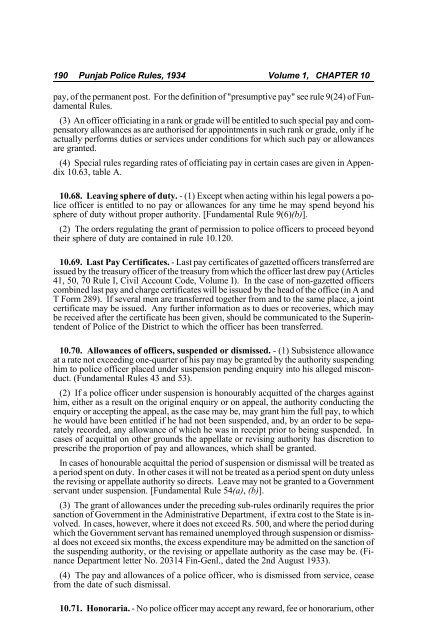Punjab Police Rules Volume 1 - Sangrur Police
Punjab Police Rules Volume 1 - Sangrur Police
Punjab Police Rules Volume 1 - Sangrur Police
You also want an ePaper? Increase the reach of your titles
YUMPU automatically turns print PDFs into web optimized ePapers that Google loves.
190 <strong>Punjab</strong> <strong>Police</strong> <strong>Rules</strong>, 1934 <strong>Volume</strong> 1, CHAPTER 10<br />
pay, of the permanent post. For the definition of "presumptive pay" see rule 9(24) of Fundamental<br />
<strong>Rules</strong>.<br />
(3) An officer officiating in a rank or grade will be entitled to such special pay and compensatory<br />
allowances as are authorised for appointments in such rank or grade, only if he<br />
actually performs duties or services under conditions for which such pay or allowances<br />
are granted.<br />
(4) Special rules regarding rates of officiating pay in certain cases are given in Appendix<br />
10.63, table A.<br />
Rule 10.68<br />
10.68. Leaving sphere of duty. - (1) Except when acting within his legal powers a police<br />
officer is entitled to no pay or allowances for any time he may spend beyond his<br />
sphere of duty without proper authority. [Fundamental Rule 9(6)(b)].<br />
(2) The orders regulating the grant of permission to police officers to proceed beyond<br />
their sphere of duty are contained in rule 10.120.<br />
Rule 10.69<br />
10.69. Last Pay Certificates. - Last pay certificates of gazetted officers transferred are<br />
issued by the treasury officer of the treasury from which the officer last drew pay (Articles<br />
41, 50, 70 Rule I, Civil Account Code, <strong>Volume</strong> I). In the case of non-gazetted officers<br />
combined last pay and charge certificates will be issued by the head of the office (in A and<br />
T Form 289). If several men are transferred together from and to the same place, a joint<br />
certificate may be issued. Any further information as to dues or recoveries, which may<br />
be received after the certificate has been given, should be communicated to the Superintendent<br />
of <strong>Police</strong> of the District to which the officer has been transferred.<br />
Rule 10.70<br />
10.70. Allowances of officers, suspended or dismissed. - (1) Subsistence allowance<br />
at a rate not exceeding one-quarter of his pay may be granted by the authority suspending<br />
him to police officer placed under suspension pending enquiry into his alleged misconduct.<br />
(Fundamental <strong>Rules</strong> 43 and 53).<br />
(2) If a police officer under suspension is honourably acquitted of the charges against<br />
him, either as a result on the original enquiry or on appeal, the authority conducting the<br />
enquiry or accepting the appeal, as the case may be, may grant him the full pay, to which<br />
he would have been entitled if he had not been suspended, and, by an order to be separately<br />
recorded, any allowance of which he was in receipt prior to being suspended. In<br />
cases of acquittal on other grounds the appellate or revising authority has discretion to<br />
prescribe the proportion of pay and allowances, which shall be granted.<br />
In cases of honourable acquittal the period of suspension or dismissal will be treated as<br />
a period spent on duty. In other cases it will not be treated as a period spent on duty unless<br />
the revising or appellate authority so directs. Leave may not be granted to a Government<br />
servant under suspension. [Fundamental Rule 54(a), (b)].<br />
(3) The grant of allowances under the preceding sub-rules ordinarily requires the prior<br />
sanction of Government in the Administrative Department, if extra cost to the State is involved.<br />
In cases, however, where it does not exceed Rs. 500, and where the period during<br />
which the Government servant has remained unemployed through suspension or dismissal<br />
does not exceed six months, the excess expenditure may be admitted on the sanction of<br />
the suspending authority, or the revising or appellate authority as the case may be. (Finance<br />
Department letter No. 20314 Fin-Genl., dated the 2nd August 1933).<br />
(4) The pay and allowances of a police officer, who is dismissed from service, cease<br />
from the date of such dismissal.<br />
Rule 10.71<br />
10.71. Honoraria. - No police officer may accept any reward, fee or honorarium, other


